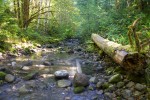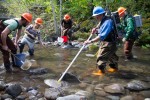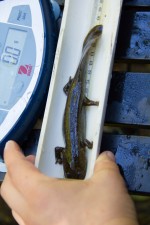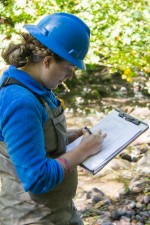This summer the Andrews Forest (AND) joined other Long Term Ecological Research (LTER) sites in the “Scale, Consumers and Lotic Ecosystem Rates” (SCALER) project, led by Walter Dodds (Konza LTER). Funded by the National Science Foundation, SCALER is a - cross-site project designed to understand structure and function of aquatic systems in order “to develop new insights regarding how best to extrapolate results from the patch to the reach scale at ambient consumer densities, as well as under reduced consumer numbers, using the simplest functions and models possible” (see http://www.k-state.edu/ecoforecasting/SCALER/index.html for details).
At each site, researchers set up exclosures of various sizes and measure instream processes, with and without aquatic consumers such as fish, mollusks, etc., to evaluate factors that affect rates and standing stocks. More specifically, we ask whether basal resources, the structure of the consumer community, and ecosystem processes measured at the scale of centimeters to 100 meters can be used to successfully predict these variables throughout a drainage network. Researchers use consistent methods across biomes and conduct experiments across a range of stream sizes at each site for 40 days.
At the Andrews LTER site, scientists Alba Argerich (OSU) and Brooke Penaluna (US Forest Service Pacific Northwest station) led a team of researchers to assess the effects of consumers—including the Cutthroat Trout and the Pacific Giant Salamander (the largest salamander in North America)—on primary production, ecosystem respiration and nutrient cycling. SCALER originally involved five biomes: tropical forest (Luquillo LTER), temperate deciduous forest (Coweeta LTER), prairie (Konza LTER), northern boreal evergreen forest (Bonanza Creek LTER), and tundra (Artic LTER) areas. A site in Darwin, Australia, recently joined the project, and with the addition of the Andrews Experimental Forest and funding from the US Forest Service Pacific Northwest Research Lab, SCALER now includes streams in the Pacific Northwest coniferous forests.

 Enlarge this image
Enlarge this image


